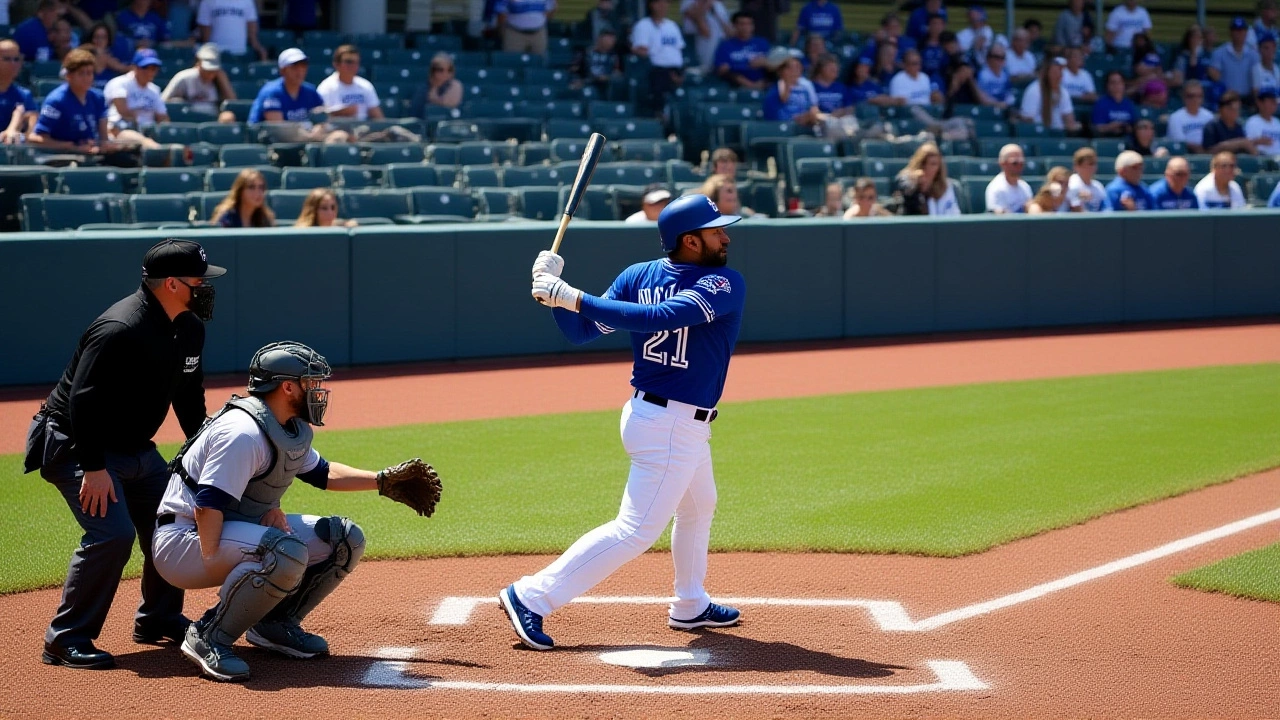Springer’s Umpire Claim Fuels Yankees‑Blue Jays Showdown

Oct, 13 2025
When George Springer, outfielder for the Toronto Blue Jays slammed a ball that looked fair but was called foul, the umpire controversy quickly spiraled into a full‑blown conspiracy theory about the New York Yankees. The drama unfolded on Tuesday, September 24, 2025, at the Rogers Centre in Toronto, Ontario, during a tightly contested match against the Boston Red Sox. At roughly 7:48 p.m. EDT, with the bases loaded and the Jays trailing 2‑1, Springer’s line drive was ruled foul by third‑base umpire Ramon De Jesus, a decision that erased a potential three‑run swing.
Background: The AL East Race Tightens
Heading into the final week of the regular season, the AL East was a nail‑biter. Toronto held a two‑game edge over New York on September 23, but injuries to key arms—third‑baseman Matt Chapman and pitcher Alek Manoah—had already dented the Jays’ offensive firepower. By the time the Red Sox game ended, the Yankees, managed by Aaron Boone, had clawed back to within a single game, setting up a decisive showdown.
The Controversial Call
Springer’s hit was a classic change‑up from Lucas Giolito that spun down the left‑field line. Replay angles suggested the ball brushed the chalk at the foul pole, yet Ramon De Jesus signaled foul. The decision, coming just seconds before Giolito’s 92.3 mph fastball that struck Springer out, sparked an audible groan from the Toronto bench.
"That didn’t feel like a foul at all," a teammate muttered, later reported by a local beat writer. The call effectively killed a bases‑loaded opportunity that could have shifted momentum dramatically.
Lip‑Reading Analysis and the Conspiracy Theory
One of the most bizarre aftershocks came from Jomboy Media analyst James O'Brien, known on‑air as Jomboy. Using frame‑by‑frame lip‑reading, O'Brien claimed Springer was heard questioning, "Does New York want the Yankees to win the AL East?" The clip went viral on Twitter, spawning memes that juxtaposed Springer’s frustration with iconic New York skyline silhouettes.
"It sounded like he was calling out a bias," O'Brien wrote in his post, adding that the phrasing was unmistakable. Whether the analysis was spot‑on or an over‑interpretation, the narrative leapt into the broader discourse about perceived umpire favoritism toward big‑market clubs.

Reactions from Teams and Media
The Blue Jays front office, led by President Mark Shapiro and General Manager Ross Atkins, released a measured statement: "We trust the integrity of MLB’s officiating and will focus on finishing the season strong." No direct comment was secured from the MLB Players Association.
Across the river, Yankee radio host Michael Kay weighed in on "The Michael Kay Show," noting, "If the umps are leaning one way, the Yankees will take whatever advantage they can get. It’s a game of inches." While Kay’s words were paraphrased by several outlets, they underscored the growing tension.
ESPN analyst Jessica Mendoza called Springer’s remark "bulletin board material" that could either motivate Toronto or give New York an extra edge. "In a five‑game stretch, the mental game matters as much as the physical," she said during a pre‑game segment.
What the Numbers Say
Statistically, umpire bias is a hotly debated subject. A 2023 study by the University of Pennsylvania examined 1.3 million pitches and found a 0.3% higher strike‑call rate for teams in the top‑10 market size. While the sample is massive, the margin is razor‑thin—hardly enough to swing a division title on its own.
For the Jays, the September slump was stark: a .231 team batting average and a collective 4.87 ERA across the rotation. In contrast, the Yankees posted a sub‑4.00 ERA and a .260 team average during the same stretch. Those figures, coupled with the late‑season injuries, paint a picture where on‑field performance, not umpire decisions, carried the biggest weight.

Looking Ahead: Final Week Implications
With only four games left, the AL East could still flip. Toronto must win at least three of its final matchups, while the Yankees need to avoid a sweep by the Red Sox and hope the Blue Jays stumble. If the controversy fuels a rally, Springer could become a galvanizing figure; if not, the story may fade like many post‑season flashpoints.
Either way, the league’s umpire crew chief is slated to review the September 24 call. A formal statement is expected by week’s end, and any amendment could set a precedent for future disputes.
Frequently Asked Questions
How does this controversy affect the Blue Jays' playoff chances?
The incident itself won’t change the standings, but the media frenzy could distract the team. Toronto still needs to win three of its final four games to clinch the division, so staying focused is crucial.
Who suggested that the umpires might be biased toward the Yankees?
The claim originated from Jomboy Media analyst James O'Brien, who used lip‑reading to interpret Springer's post‑call remarks.
What does MLB say about umpire impartiality?
MLB maintains that its umpiring crews are evaluated continuously and that any alleged bias would be investigated through its official review process, which is scheduled to examine the September 24 call.
Did any other players comment on the foul‑ball call?
While no official quotes were released, several teammates were heard muttering displeasure in the dugout, and veteran pitcher Kevin Gausman reportedly told reporters the team "needs to keep its head in the game" despite the controversy.
What are the odds of a tie‑breaker game if the division ends level?
MLB rules dictate a one‑game tiebreaker if teams finish with identical records. Given both clubs have a similar number of remaining games, a tie‑breaker is plausible, though the final schedule would determine the exact date and venue.